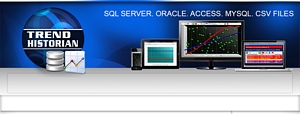OPC TREND HISTORIAN.NET
OPC Trend Historian.Net offers real-time 2D and 3D trending and with OPC Database.NET historical trending. It includes online

PRODUCT FEATURES
- All OPC Systems.NET components are Smart Client compatible.
- Configure both local and remote OPC Systems Service configurations manually, with CSV Export and Import, or programmatically from your own application.
- Control and modify Tag, Data Logging, Alarm Logging, Alarm Notification, Recipe, Report, and Security configurations along with and Options from your own application!
- Unlimited remote clients.
- Implement Smart Client deployment with 100% managed components.
- Use Visual Studio 2012, 2010, 2008, and Expression Blend 4 to create your own applications.
- Extremely fast data update with very low CPU usage.
- Very cost effective solutions for both individual and corporate users.
- Perfect solution for OEMs to create their own SCADA / HMI software to package with their systems.
- Fast development time with no code required.
- Easy setup of trending, alarming, data logging, reports, recipe management, and security in central configuration.
- Use your own data from .NET applications.
TREND HISTORIAN COMPONENT FEATURES
- Trend Historian component is for use in developing local and remote Visual Studio.NET 2012, 2010, 2008, 2005, and 2003 WinForm and WPF applications.
- 100% managed OPC Trend.NET trend window component.
- OPC Trend.NET supports 2D and 3D trending charts.
- OPC Trend.NET components can access both local and remote Tag Parameters for Values, Time On and Count data, Alarm Status, and Alarm Limits.
- There is no data loss in the OPC Trend.NET component if it loses a remote network connection to other OPC Systems Services.
- Support on-line modification for all properties.
- Interface provides support for programmatic methods for retrieving data from database and binding to a DataTable with the GetTrendDataTable method.
- Data Logging for SQL Server, SQL Server Desktop (MSDE), Oracle, ODBC, mySQL, and CSV files.
- 100 nanosecond resolution for Data Logging.
- Multiple data logging types including Continuous, Event Driven, Time of Day, Data Change Row, and Data Change Column.
- Activate logging from OPC values.
- Change the database server, database name, table name, or CSV path and file name while the system is logging from OPC values.
- Log values from remote OPC Systems Services and lose no data on temporary network failures.
- Retain all data values on database engine failures.
- Support on-line modification for all properties.
- Application execution on remote systems without installing the application on the remote systems.
- Up to 1 million points / second
- Local Data Buffering (Data assurance)
- Able to reliably archive data form remote location with poor or unreliable network connections
